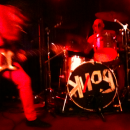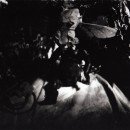When I first moved to this strange island nearly ten years ago – before the long night of the scars and before the horrors kicked in – I lived a better life. Japanese oddity and child of the moon, I was good when I was young. For years I worked with the sick, the strange, the deranged, partly motivated by the desire to help, knowing that in some way I was made to deal with pain and that it sustained me even as I tried to gulp it down and make it all go away … I was also hoping to impress a beautiful French girl, my belle dame sans merci.
One day I was sitting in the mental health café with a teenage depressive who explained his despairing view of relationships.
‘Most people can go out with pretty much anyone,’ he said. ‘They’re interchangeable. You can go into any club and the standard male will pick out girls almost at random. It doesn’t matter who she is. There are probably about twenty, thirty, forty girls in there who he’d settle for. If one’s not interested, he just moves onto the next one. Whereas for me there would only be one, or zero, or worse … just lots of negative roads to unhappiness.’
I explained that I felt the same. There was nothing so strange about that.
He seemed to find solace in my reassurance. Perhaps he felt more normal, less alone …
Perhaps that was a mistake. On reflection, it seems more likely that we’re both abnormal. But I didn’t let on.
When I listen to Brooklyn band of the moment the Antlers, I think of this boy and that conversation, and I wonder whether he, like me, also finds in their albums Hospice and Burst Apart a soulful soundtrack to his damaged life.

Tonight, however, my companion is not one of life’s more delicate spirits. He’s my gruff, foul-mouthed boss. He likes heavy metal and prog rock. He’s also a bitter, angry man who hates the world. I’ve made it my business to expand his musical horizons and bring him kicking and screaming into the twenty-first century. A bit of lyrical misanthropy will probably help, so the Antlers seem like an ideal choice for this encounter with youth culture and modernity.
We arrive at Sound Control and take our place among the Top Shop girls and the young men with maturing moustaches. One teenager has thick NHS glasses and a brilliant black moustache and looks like his Dad probably did in the 80s. He looks like a paedophile but doesn’t seem at all phased by it.
Support tonight comes in the guise of generic electro blandness from a band called Worship. Boasting no less than three Apple Macs on stage, they’re a bit like a modern-day New Order, only with better laptops but (I’m guessing) none of the tragic history. Their songs sound like they might’ve been lifted from a bad David Bowie album. At one point in between tracks I’m fairly sure they say, ‘Hi, we’re from Newbury, which is in Berkshire.’ It’s probably the least rock ‘n’ roll thing I’ve ever heard in my life.
‘This is the sort of semi-prog rock shit that I listen to,’ says my boss, approvingly.
It’s utterly vacant stuff: a band possibly picked to support the main act because they’re riding on the wave of the same musical zeitgeist and appeal to a similar demographic (which is definitely not me and my boss, so fuck me); but they have none of the substance of the Antlers.
Even my boss tires after a while.

‘Has nothing happened to music in the last twenty years?’ he complains. ‘Fuck. I was expecting to have missed something.’
We go outside for a cigarette, with my boss bemoaning the apparent intellectualism that has, in his view, soured music, turning it into ‘wimp rock’. ‘I’d like them a lot more if they stopped trying to be clever and sang about tits and shagging or something …’
As he expands on this theory, I tune into a conversation between three students standing next to me. A boy is comparing the new jackets worn by two of his female friends, who go to universities on the opposite sides of the river. One jacket is plaid and the other is leather.
‘So Manchester is all about fabrics’, he observes, ‘and Salford is all about animal fashion’.
The first song by the Antlers is promisingly chaotic. This is either a bravely experimental start to the set, or they’re hammered. The keyboard player’s microphone isn’t working and you suspect it’s probably his fault. The song draws to an end with lead singer and guitarist Peter Silberman shooting the drummer worried looks that say please end this song somehow. As he sets up the sort of easy finish that even Fernando Torres couldn’t miss, I notice that the balding drummer has joined the moustache gang in a way that makes him look like Bruce Grobbelaar.
‘They’re fucked,’ my boss observes. But he’s impressed and so am I.
As the set goes on they seem to sober up and what they lose in wildness they gain in authority and control. ‘You didn’t tell me you were taking me to a gig full of the sort of music I listen to all the time,’ my boss says. ‘This is like a mix of King Crimson and early Genesis. I have to say, I quite like it. I’d just like to know whether it’s some weird accident that they’ve invented the exact same music in New York city or whether they’re deliberately ripping off stuff that English bands invented in the 70s.’
They’re better than that though. The songs are brooding and draw on a wider range of influences. Sometimes they’re spare, allowing a haunting delay on Bruce Grobbelaar’s snare to ricochet through the room. At one point towards the end there’s a fucking angelic interlude where Silberman’s soaring vocal is probably as close to sounding like Jeff Buckley as it comes. At other times they’re muscular and loud, rocking out like a slightly more psychedelic version of Local Natives.
‘Is everyone perfectly content with the world?’ asks Silberman, knowing that if they were then they’d have no need to be here. For it is the desperate, doom-ridden intensity of tracks such as ‘Sylvia’ that we’re after.

I explain the concept of the album Hospice to my boss, which likens the mutually destructive end of a fucked up relationship to a nurse looking after a patient, with possible references to Sylvia Plath’s suicide (‘Sylvia, get your head out of the oven’) setting the tone for the album’s descent into misery, sickness, self-loathing and bodily harm. My boss takes the fact of a concept album as further proof of their progish tendencies but this is the kind of music that could’ve only happened in the 1970s if the English bands he venerates had had far better taste in literature and lived the kind of lives that they knew or feared might actually make for good art, might actually be needed for good art … The Antlers also have much better haircuts.

The highlight of the night is the set-closing anti-ballad ‘I Don’t Want Love’ which sees Siberman defiantly rejecting the world of feeling and emotion because this has become a world of pain … But there is total vulnerability in this closing of the heart – and emotion too. A song about a man at war with his desires, it speaks to anybody who has been there and understands, like the boy in the mental health café, that the sentiment of the chorus, after which the song takes its title, and which is tonight delivered with passionate intensity by Silberman, so achingly and heart-breakingly implies its opposite.
The Antlers Website
All photographs © Gemma Cowburn.
More Atrocity Boy Scribblings.








Atrocity Boy, you are, I suspect, four parts bastard but I’m enjoying your writing nonetheless.
Thanks. And nice Louche FC reference! I’m not that nice though.
“This is like a mix of King Crimson and early Genesis”. Good god – forty years ago, you might have found that an interesting prospect. Nowadays, it’s as though punk never happened.